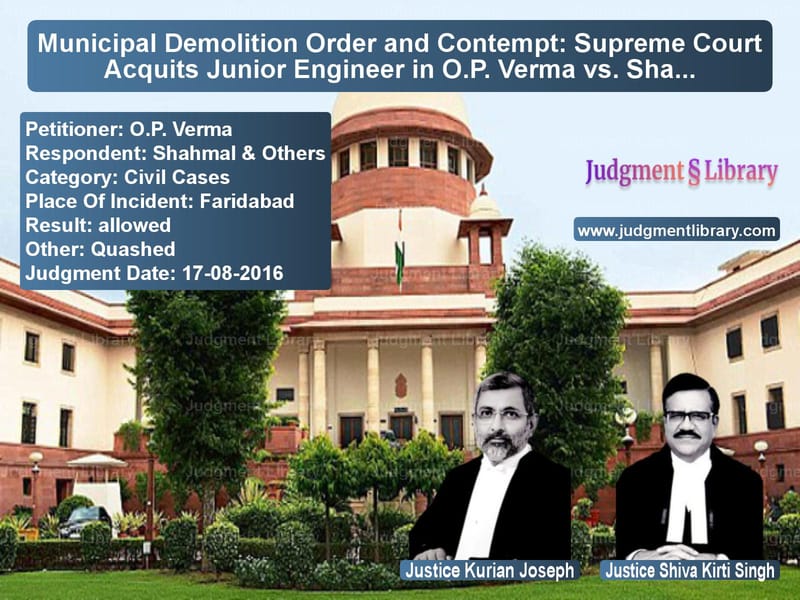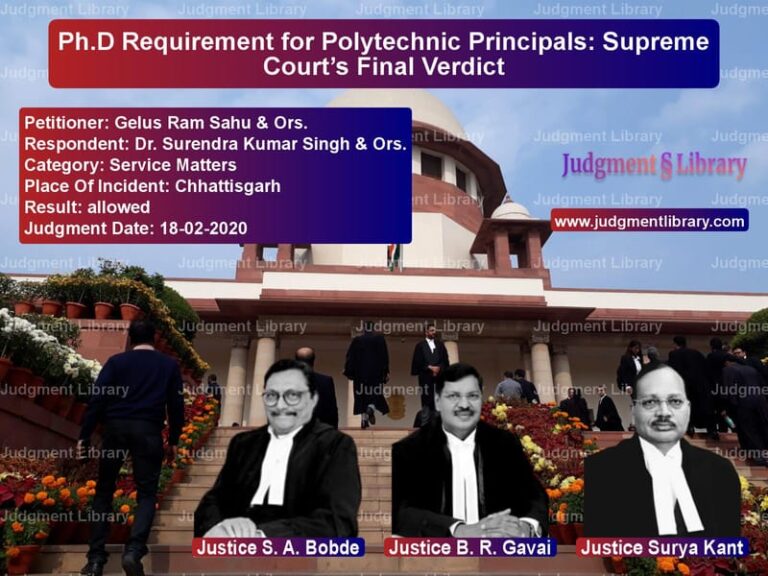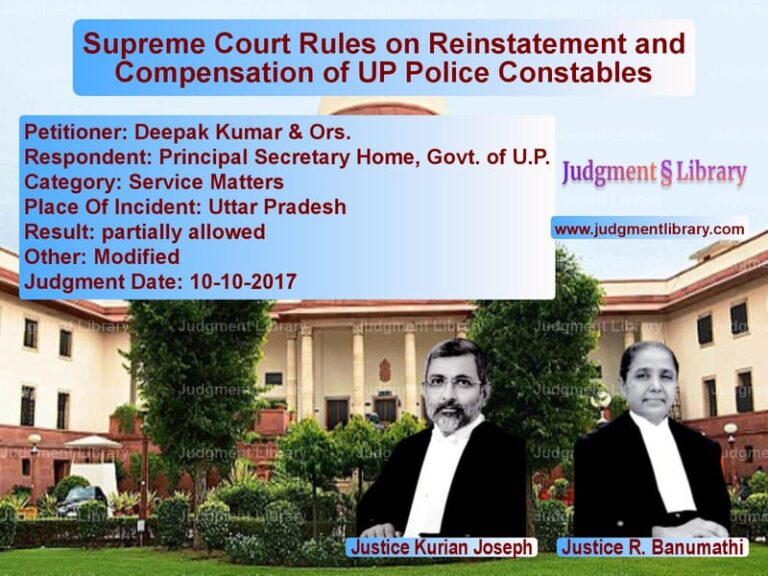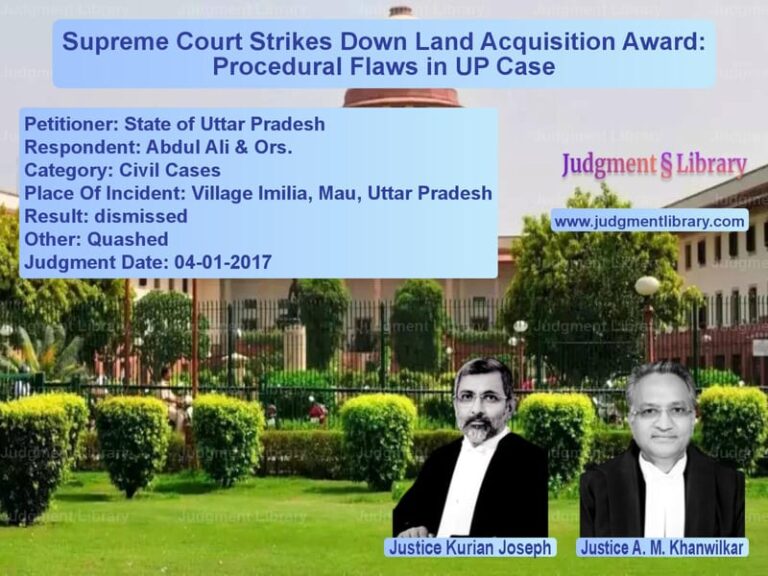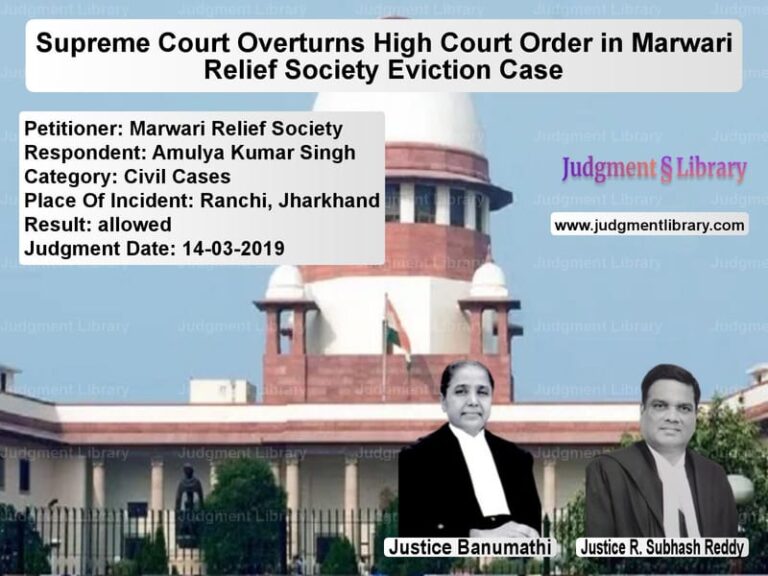Municipal Demolition Order and Contempt: Supreme Court Acquits Junior Engineer in O.P. Verma vs. Shahmal Case
The case of O.P. Verma vs. Shahmal & Others before the Supreme Court of India addressed the issue of contempt of court arising from the demolition of a building in Faridabad. The case revolved around whether the appellant, O.P. Verma, a Junior Engineer at the Municipal Corporation, should be held solely responsible for executing a demolition order that was issued by higher municipal authorities. The Supreme Court ultimately ruled in favor of O.P. Verma, setting aside the High Court’s decision and acquitting him of the charges.
Background of the Case
The dispute arose when the respondents (plaintiffs) filed a petition under Order 39 Rule 2A of the Code of Civil Procedure (CPC) against the appellant, alleging that he was responsible for demolishing their building in violation of a court order. The Trial Court found O.P. Verma guilty and sentenced him to one month of imprisonment, despite the fact that his superior officers, the Commissioner and Joint Commissioner of the Municipal Corporation, were discharged from liability.
O.P. Verma challenged this decision before the High Court, but the High Court refused to interfere with the Trial Court’s order. Aggrieved by this, he approached the Supreme Court.
Legal Issues Before the Supreme Court
The Supreme Court was required to determine the following:
- Whether a Junior Engineer executing a superior officer’s order can be held in contempt of court.
- Whether the lower courts erred in punishing the appellant while exempting his superior officers from liability.
- Whether the appellant’s role in the demolition process constituted a deliberate violation of the court order.
Arguments by the Appellant
The appellant, O.P. Verma, presented the following arguments:
- He was merely executing an order issued by the Commissioner and Joint Commissioner of the Municipal Corporation.
- He acted under the direct supervision of his superior officers, who had already been discharged from the case.
- His actions did not constitute a willful defiance of a court order.
- Holding him solely responsible for the demolition while exonerating his superiors was arbitrary and unfair.
Arguments by the Respondents
The respondents (plaintiffs) countered with the following points:
- The demolition was carried out despite a legal stay order, violating the plaintiffs’ rights.
- The appellant was directly involved in supervising the demolition, making him liable for contempt of court.
- The superior officers’ discharge from liability did not absolve the appellant of his responsibility to follow the court order.
Supreme Court’s Observations
After reviewing the facts and legal arguments, the Supreme Court ruled in favor of O.P. Verma, noting:
“The appellant had only implemented the order passed by the Commissioner and Joint Commissioner, Municipal Corporation, Faridabad, and that too under the direct supervision of superior officers.”
The Court further observed:
“It is seen that the Commissioner and Joint Commissioner, Municipal Corporation, Faridabad were discharged in the proceedings and only the appellant was visited with the punishment.”
Final Judgment
The Supreme Court ruled that the appellant should not be punished when his superior officers had been exempted from liability. The Court passed the following orders:
- The appeal was allowed.
- The impugned judgment of the High Court was set aside.
- The appellant, O.P. Verma, was discharged from all charges.
- The Court accepted the apology tendered by the appellant in court.
Implications of the Judgment
This case has several legal implications:
- Execution of Official Orders: The judgment reinforces the principle that employees acting under the orders of their superior officers should not be held individually liable if they were merely following official directives.
- Contempt of Court and Liability: The ruling clarifies that liability for contempt should be imposed equitably and should not single out lower-ranking officials when higher authorities are responsible for the decision-making process.
- Precedent for Government Employees: The judgment provides clarity for public officials who may find themselves in similar situations, ensuring that liability should be proportionately assigned.
- Judicial Oversight in Administrative Actions: The ruling highlights the importance of courts scrutinizing administrative actions to ensure that liability is fairly distributed.
Conclusion
The Supreme Court’s decision in O.P. Verma vs. Shahmal & Others highlights the importance of fairness in judicial proceedings. By ruling that a subordinate official should not be solely punished when his superiors were exempted, the Court reinforced principles of administrative justice. This judgment sets a precedent for future cases involving government employees and contempt of court, ensuring that liability is assigned justly and proportionately.
Don’t miss out on the full details! Download the complete judgment in PDF format below and gain valuable insights instantly!
Download Judgment: O.P. Verma vs Shahmal & Others Supreme Court of India Judgment Dated 17-08-2016-1741878584608.pdf
Direct Downlaod Judgment: Direct downlaod this Judgment
See all petitions in Property Disputes
See all petitions in Contract Disputes
See all petitions in Damages and Compensation
See all petitions in Judgment by Kurian Joseph
See all petitions in Judgment by Shiva Kirti Singh
See all petitions in allowed
See all petitions in Quashed
See all petitions in supreme court of India judgments August 2016
See all petitions in 2016 judgments
See all posts in Civil Cases Category
See all allowed petitions in Civil Cases Category
See all Dismissed petitions in Civil Cases Category
See all partially allowed petitions in Civil Cases Category

